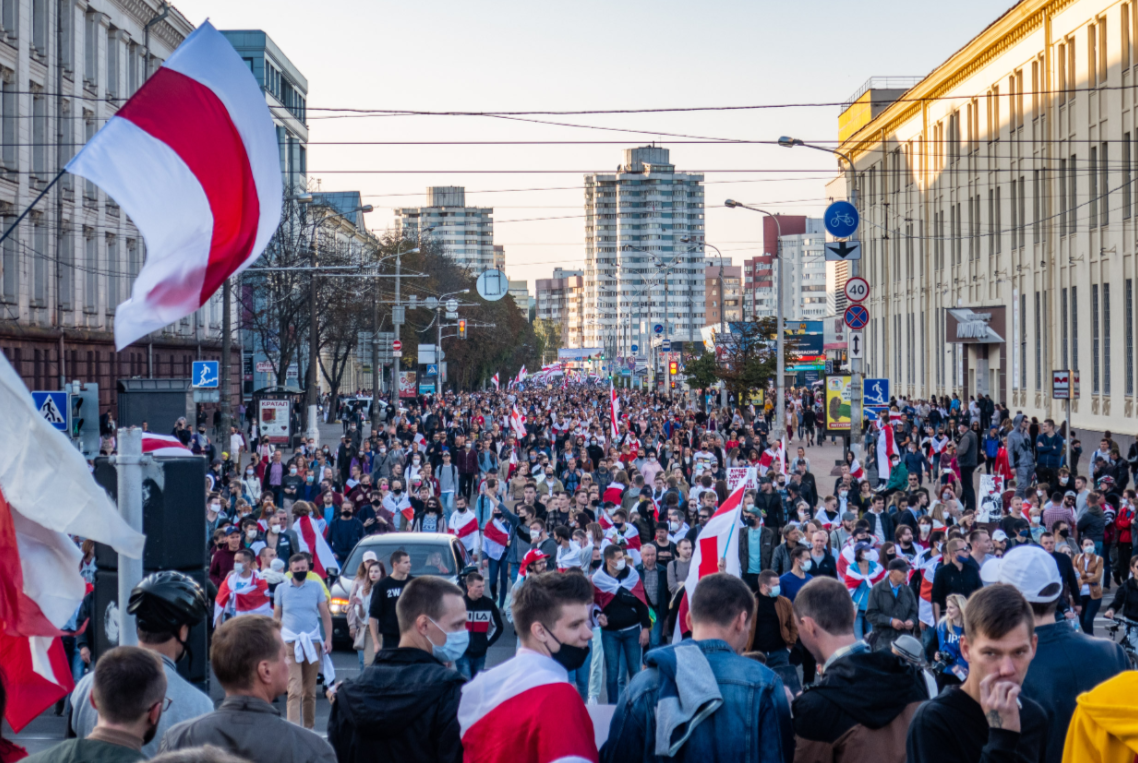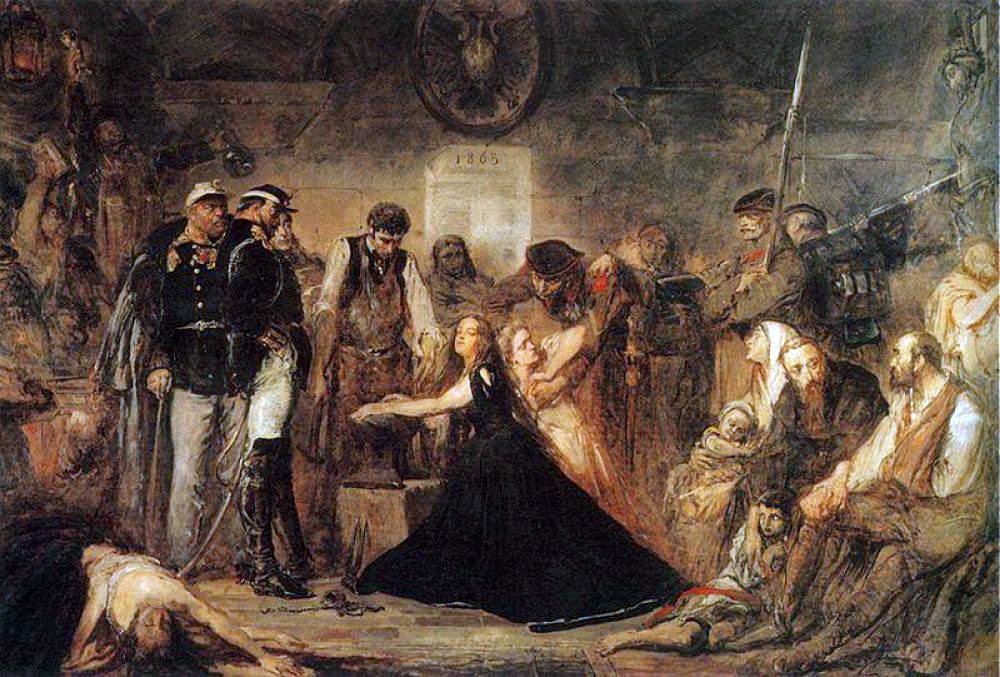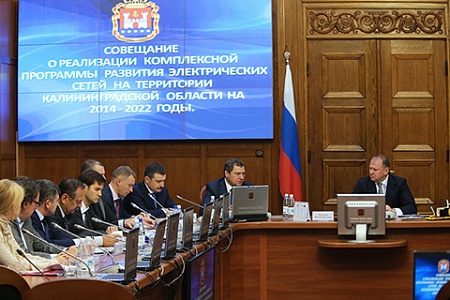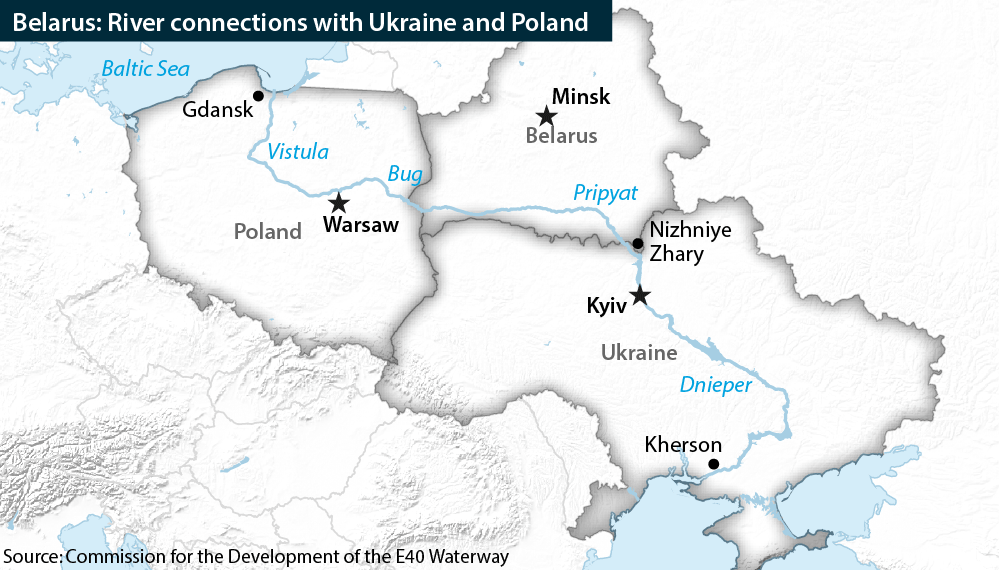One year ago, on 9 August 2020, Belarus saw regular presidential elections.
To that red-letter day, it was clear the election results would be falsified. Why? The start of the electoral campaign was marked by the arrests of opposition candidates and their supporters. Seven presidential candidates submitted their campaign papers. Pre-election internet polls showed Viktar Babaryka, Sergei Tsikhanousky, and Valery Tsepkalo as top alternative leaders. All three nominations were denied registration as presidential candidates at different election campaign stages. Tsikhanousky and Babaryka faced arrest when collecting signatures for their candidatures. Amnesty International recognized them as prisoners of consciousness. Tsepkalo fled the country in fear of politically motivated persecution.
Lukashenka’s suppression of the right to vote and be elected was met with a wave of protests around Belarus. It intensified following the August 2020 elections. What was unexpected is the scale of protests and the government brutality.

For the past year, Minsk made its way from an authoritarian state capable of engaging in negotiations to a nonamicable dictatorship posing a threat both to its nationals and neighbouring countries. Western states resorted to imposing personal sanctions on Lukashenka. Notably, the EU sanctions incumbent heads of states in exclusive cases only -- when it decides they ceased to be legitimate and bridges can be burnt.
Now, the regime is capable neither of controlling the internal situation nor of saving the economy from collapse without Russia’s helping hand. Yet, Putin has not managed to remove Lukashenka from the post or convince him into sharing the power with the figures more loyal to Russia.
This story is not over yet. And Ukraine has not had its last say. The country is highly dependent on recent Belarusian change in foreign relations, especially, since Lukashenka makes no secret that changes on the Belarus-Ukraine border might take place.
These aspects have been in detail analyzed by European Pravda.
Why has the regime withstood?
The Investigation Committee of Belarus initiated 4200 criminal cases against the participants of peaceful protests and some 605 persons were recognised as political prisoners, reports Minsk-based Viasna Human Rights Center.
However, the total number of Belarusians who suffered from Lukashenka’s security forces for the past year is way larger.
At the same time, the regime attempted to instil fear in its citizens by torture. Stories and photos of the detainees have shocked the world and Street Okrestina in Minsk where one of the capital’s prisons is located, has become the symbol of these tortures.
It must be mentioned that Lukashenka’s regime has used force to gag the opposition. Police brutally dispersed the protests against the falsification of the 2010 presidential election.

It would be reasonable to say this is because the protests were surprisingly populous for Lukashenka. Some actions in summer and fall last year gathered hundreds of thousands of people!
Previously apolitical Belarusians joined the protests. Lukashenka’s visit to the Minsk Wheel Tractor Plant on 17 August last year is illustrative in this regard. He believed the working class employed at state-run companies are his loyal constituency that would not turn to the opposition. Instead, the crowd of factory workers chanted “Go away!”
Photographs of that day spread all over the world; that moment could have become a turning point – Lukashenka almost lost the game.
However, he took the punch and mounted a counter-offensive. He managed to preserve the loyalty of the officials (only a few diplomats defected to the protesters’ side) and, most importantly, of the security officers. Lukashenka was able to cling to power until the winter cold and stepped up pressure on the demonstrators.

Meanwhile, the protests dwindled down: in 2021, no public procession comparable to those of last year’s were managed to be held.
The government continued dealing with the protestors. And arrests were not the only means. As the crackdown inside the country picked up speed, borders remained open and the discontented fled. Thousands of Belarusians used this chance and the process is likely to continue.
Those who refused to leave were pressed out from the country, or detained and transferred abroad.
Course on Moscow
It is hard to believe that Alyaksandr Lukashenka approached the 2020 elections with moderately anti-Russian rhetoric, positioning himself as a defender of Belarus from a Moscow takeover. He portrayed his biggest opponent, banker Viktar Babaryka, as Russia’s “ Fifth Column.”
The West has partially played along with this rhetoric. Half a year before the election, the United States Secretary of State Antony Blinken visited Minsk which was viewed as Belarus’ thaw in relation with the West.
But the falsified election and unprecedented cruelty in suppressing protests shut the door on Belarus’ pro-West policy. Besides, the EU, USA, and all Western world along with Ukraine announced they do not recognize the election results and do not consider Lukashenka the president of Belarus.
Although the West also fails to declare the opposition leader Sviatlana Tsikhanouskaya as the winner of the presidential run, she is certain to have way more legitimacy.
Since August 2020, she has conducted negotiations with key world politicians (including Joe Biden and Angela Merkel) in the capacity of an opposition leader. Thus is the level Lukashenka will never again reach.

In a status quo like this, rapprochement with Russia (and to a lesser extent China) remains the only option left for “Europe's last dictator.”
But Russia is not satisfied with this state of affairs: the Kremlin has given its helping hand to Minsk even in suffocating protests (including sending “troops” of TV propagandists) and now is expecting further concessions from Lukashenka.
One of them is launching a constitutional reform in Belarus to deprive the president of individual and exclusive rule. Another one is early parliamentary and presidential elections. These measures would diminish Lukashenka’s power in the state and further Belarusian integration with Russia.
Despite some strong statements (for instance, Lukashenka announced the possibility of Russia sending troops to Belarus), de facto integration with Moscow remains in words only.
The self-proclaimed president of Belarus has not consented to moves that might reduce his almightiness. Russian imperial expectations for Belarus’ swift loss of sovereignty did not materialize and are not likely to do so any time soon. The more stable Lukashenka’s regime becomes, the less batka is willing to deliver on the promises before the Kremlin.
In particular, parliamentarians have already drafted a law to introduce a constitutional change that fails to stipulate considerable redistribution of power from the president to the parliament and the cabinet of ministers (which was previously announced). Neither does it provide for setting up a position with special competencies which Lukashenka could fill to keep controlling the situation in the country, should he resign from the presidential post. Nor Batka is going to keep a promise with regard to early elections.
When the traditional white-and-red flag became a symbol of the protests (previously it had been used only by marginalized national democrats), Belarus state propaganda likened the flag to Nazi collaborators in WWII.
Why are protesters in Belarus using the white-red-white flag?
And these changes corresponding to the Kremlin’s interpretation of history manifestly play into Russia’s hands.
Bunker regime
Like any authoritarian leader, Alyaksandr Lukashenka had both security officers and systemic liberals on his team. The latter were needed to preserve economic stability that allowed the government to perform the unwritten social contract with the people – social benefits in exchange for unfreedom.
The 2020 protests destroyed this balance. The key state positions were entrusted upon security officers and the liberals had to either resign or modify their rhetoric and mimic the enforcers (like Belarus’ Foreign Minister Vladimir Makei did). All this terminated the social contract once and for all. Today, in his relationship with the people Lukashenka relies purely on force and not liberal groups.
This makes any economic breakthrough impossible. Given that the West is imposing sectoral sanctions on Belarus, the country is sinking into dependency on Russia’s financial aid. Despite Minsk’s resistance to enhance integration, Moscow does not deny giving support, although its amount only allows Belarus to get by.
At the same time, changes in the government led to numerous mistakes. The state system is no longer capable of calculating the positive-negative implications of its decisions. Either that or the public servants who recognize the fatality of the decisions do not dare communicate this to Lukashenka.
The first instance of such thinking was a special operation to forcefully land a Ryanair plane in Minsk and arrest opposition blogger Roman Protasevych.
Good old Soviet tradition of coerced public confessions springs up in Belarus
Such actions shocked the world and resulted in merciless sectoral sanctions and thus, financial losses of the regime.
In response, Lukashenka turned to blackmail, shuttling vast numbers of Middle Eastern refugees to the EU.
However, we can already say that the blackmail did not lead to the EU cancelling or softening sanctions: this option was not even on the table. On the contrary, perspectives of the sanctions being strengthened are quite realistic.
Lukashenka’s shaky throne
Despite maintaining control over the state, Lukashenka’s regime can hardly be deemed stable.
Economic problems emerged long before last year’s election and exacerbated for the past year. Economic sanctions jeopardize Western international lending.
Minsk is aware this poses risks to financial reliance on Russia and tried to balance them by placing state bonds in China and causing scepticism among the experts. They say for Russia, these bonds failure will mean a chance to exert more pressure.
Belarus has not yet felt the full effect of the sanctions. Operative sectoral sanctions do not cover contracts previously concluded and will start working at full strength in the second half of 2022.
The mass emigration will become more noticeable and considerable because among the emigrants were more often the workers who earned more, and thus, paid more taxes.
At the same time, despite the decrease in the number of demonstrations, the protest sentiment is still there: their root cause remains, while Lukashenka lacks the means of “buying” the loyalty of the hesitant.
At this point, anything can trigger another wave of protest.
A difficult choice for Ukraine
Since the outbreak of the protests in Belarus, official Kyiv publicly showed support for the protesters and denounced the regime. Ukraine also joined a few tough statements pronounced by the EU for its partner states. The country also declared it does not recognize Lukashenka as the head of the state following his “inauguration.”
Nonetheless, Kyiv resists imposing personal sanctions against Lukashenka and sectoral sanctions against the state economy.
The only exception was Ukraine’s ban on flights to Belarus declared by Ukraine following the Ryanair incident even before the EU states started taking similar decisions.
Diplomats say a sanctions war may be too painful for Kyiv. Not only from the economic but also from the security perspective. Without resources to punish Ukraine economically, the dictatorship may respond asymmetrically. For instance, allow Russia to access the 1000-km Ukrainian-Belarusian border. Now Lukashenka is hinting that the policy towards the Ukrainian border will be revisited since Ukraine “has taken a course to confrontation.”
As for an economic standoff, Belarus introduced limits on Ukraine’s food export in response to Kyiv’s protective tariffs on Belarusian auto industry production.
In the first days of the revolution, Kyiv was reluctant to undertake any measures whatsoever; this position changed with the next developments in Belarus. It may very well be that the killing of the Belarusian activist Vitaly Shishov in Kyiv on 2 August 2021 may become a point of no return and lead to a tougher response from Ukraine if the Belarus state’s involvement in the murder will be established.
But at the moment, Kyiv does not know how to respond. Ukraine does not have a Belarus policy; telling is the fact that Kyiv avoids meeting Sviatlana Tsikhanouskaya, although she has been received by virtually all the western leaders.
However, one thing is clear: relations with Lukashenka will not be restored.
The regime has gone too far, crossing more and more redlines. And the key dilemma here is that not only Ukraine but no one else in the world, including the EU and USA, know how to stop it.
So the whole world is left to address new crazy moves and ideas of Lukashenka and await denouement that is unlikely to be bloodless.
Further reading:
- Belarusian politics and the tyranny of simple solutions
- The Lukashenka regime outlaws “unsanctioned” rallies, doubles down on media repressions
- No, Belarusian dissident Protasevich is not a neo-Nazi. But the Kremlin sure wants you to think so
- How Alyaksandr Lukashenka stole the Belarus presidential election
- Discover Belarus, “the country of nine million hostages,” with Belarusian writer Andrei Khadanovich
- Why don’t Belarus protesters shun Russia?
- Tsikhanouskaya says Belarusian opposition has “lost the streets” for now but won’t end the revolution
- “You all know your numbers”: polling station rehearsed announcement of Belarus dictator Lukashenka’s “victory”
- Mother says her son died in hospital after being arrested in Homyel, Belarus
- Wave of strikes sweeps over Belarusian industry on third day of protests against rigged elections
- Support Belarusian pro-democratic activists and their families
- Belarus election: contested result sparks massive unrest as Europe’s ‘last dictator’ claims victory
- From “deescalation and dialogue” to “listening to demands for change”: international reactions to Belarus elections
- What you need to know about the unprecedented Belarus presidential election, in a nutshell





